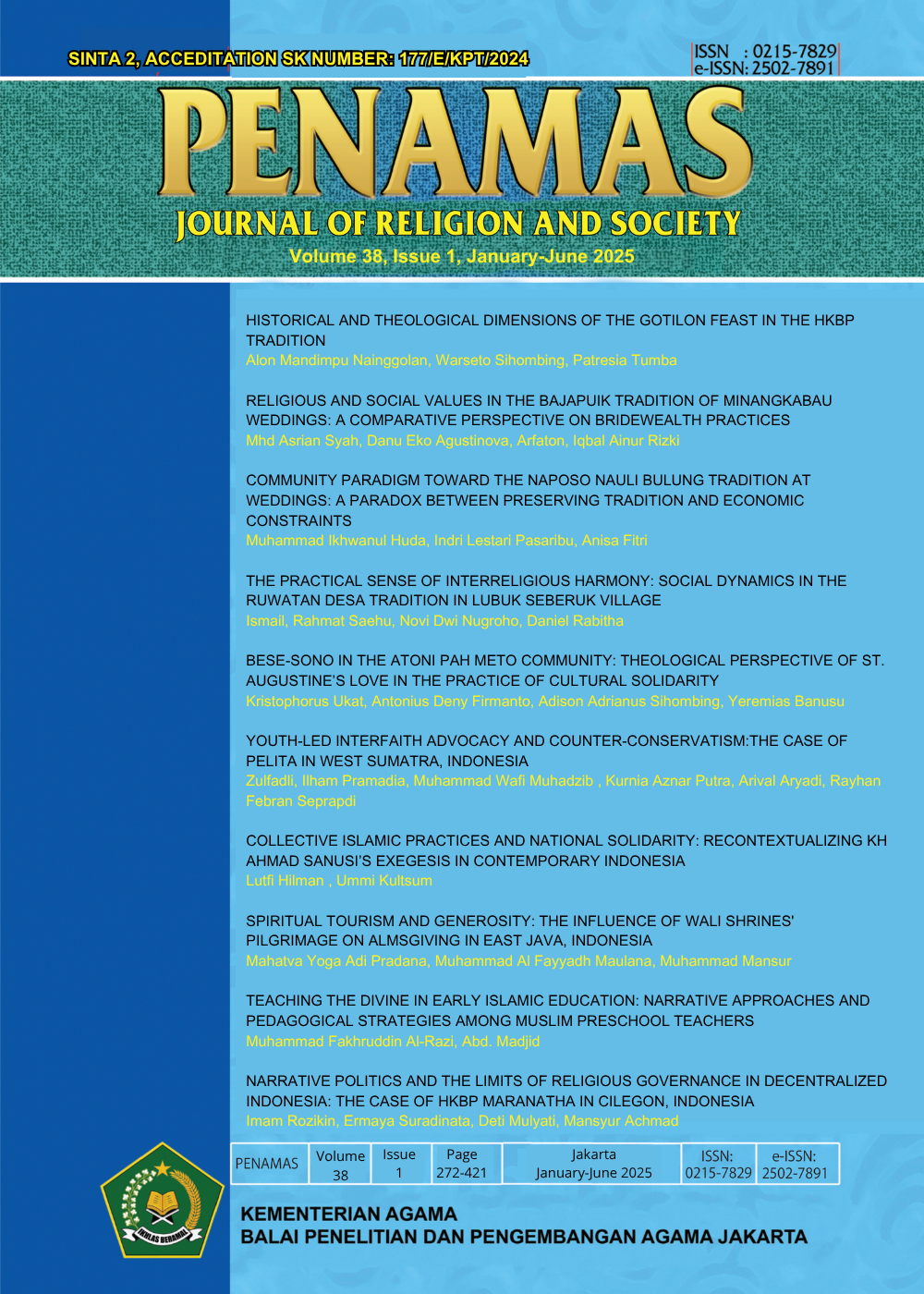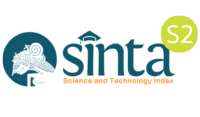HISTORICAL AND THEOLOGICAL DIMENSIONS OF THE GOTILON FEAST IN THE HKBP TRADITION
DOI:
https://doi.org/10.31330/penamas.v38i1.871Keywords:
remembering, gotilon party, Toba Batak, giving thanks, HKBP ManadoAbstract
The gotilon feast is an ancient tradition that has been observed both before and after the introduction of Christianity and has undergone a transformation in meaning after being incorporated into the church liturgy in the HKBP Manado. This research aims to analyze the gotilon feast in the context of the Toba Batak diaspora in Manado by examining how this practice is carried out in HKBP Manado as a space for an encounter between religious identity and Toba Batak cultural expression. Using a light qualitative-ethnographic approach, as well as Pierre Bourdieu's theoretical framework - specifically the concepts of habitus, field, and doxa; this research shows that this tradition is the result of symbolic practices that are continuously reproduced, not solely because of theological dogma, but as a result of the social and historical structures that shape it. Within the diasporic social field, the gotilon feast occupies a strategic position as a mechanism for maintaining collective identity. However, it also presents a tension between religious particularism and culture and the demands of multiculturalism within the church. As a spiritual and social glue, this practice makes an important contribution to the conceptualization of contextual theology, the sociology of religion, and the dynamics of Toba Batak diaspora traditional practices.
References
Ambarita, J., Siahaya, A., & Park Mi Kyong. (2024). Local Traditions and the Dynamics of Diversity in Negeri Waraka. Penamas, 37(2), 145–157. doi: 10.31330/penamas.v37i2.800
Angga. (2018). Ugamo Malim. https://kebudayaan.kemdikbud.go.id/bpnbaceh/sipaha-lima-ritual-bersyukur-para-penganut-ugamo-malim/
Aritonang, J. S. (1988). Sejarah Pendidikan Kristen di Tanah Batak. Jakarta: BPK Gunung Mulia.
Asnawati. (2013). Komunitas Ugamo Malim atau Permalim. Harmoni, 12(2), 152–162. https://jurnalharmoni.kemenag.go.id/index.php/harmoni/article/view/182
Batee, T. H., Suwena, I. W., & Sama, I. N. (2023). Gereja HKBP dalam Mempertahankan Identitas Kultural Diaspora Etnis Batak Toba di Kota Denpasar. Sunari Penjor : Journal of Anthropology, 7(1), 9. doi: 10.24843/SP.2023.v7.i01.p02
Bevans, S. B. (2002). Model-model Teologi Kontekstual. Surabaya: Sylvia.
Bourdieu, Pierre. (1990). In Other Words: Essays Toward a Reflexive Sociology. Cambridge: Polity Press.
Creswell (2018). Research Design: Qualitative, Quantitative, and Mixed Methods Approaches. Los Angles: SAGE.
Faustyna. (2024). Marketing Event Public Relations. Medan: UMSU Press.
Hutasoit, J., Tetty, M., & Damanik, S. F. (2021). Semiotics on Gotilon Batak Toba Ceremony in Dolok Sanggul Humbang Hasundutan. Linguistica, 10(2), 497–508. doi: 10.24114/jalu.v10i2.26542
Lamria Raya Fitriyani, Xenia Angelica Wijayanto, L. N. (2021). Batak Christian Congregations as Part of Self and Cultural Identity. Nusantara: An International Journal of Humanities and Social Sciences, 3(1), 1–14. doi: DOI: 10.6936/NIJHSS.202106_3(1).0001
Manik, et al. (2023). Ulos sebagai Simbol Berkat dalam Budaya Batak Toba dan Relevansinya bagi Gereja Katolik. Purwadita: Jurnal Agama Dan Budaya, 7(1), 60–71. https://jurnal.stahnmpukuturan.ac.id/index.php/Purwadita
Marpaung, C. A. (2024). Bentuk dan Fungsi Lagu Buku Ende N0. 435 “Marolopolop Tondingki” di Gereja HKBP Teladan SeiMati Ressort Medan Labuhan. INNOVATIVE: Journal of Social Science Research, 4(1), 1–11. https://j-innovative.org/index.php/Innovative
Pakpahan, B. J. (Ed.). (2020). Teologi Kontekstual dan Kearifan Lokal Toraja. Jakarta: BPK Gunung Mulia.
Purba & Munthe, P. (2021). Tinjauan Dogmatis terhadap Pemahaman Jemaat HKI Baringin tentang Pesta Gotilon dalam Memberikan Persembahan. Jurnal Sabda Akademika, 1(2), 27–34. https://jurnal.sttabdisabda.ac.id/index.php/JSAK/issue/view/6
Russell, B. H. (2006). Research Methods in Anthropology: Qualitative and Quantitative Methods (4th ed). Lanham, MD: AltaMira Press.
Sharon M.Ravitch, N. M. C. (2016). Qualitative Research Bridging the Conceptual, Theoretical, and Methodological. Los Angles: Sage Publications.
Sianipar, E. & Gunawan. (2024). Pesta Gotilon Tradition as a Means of Strengthening Relations Between Congregations. Indonesian Journal of Sociology, Education, and Development, 6(2), 161–177. doi: 10.52483/41s2dr04
Sihombing, L., & Simbolon, I. R. (2024). Kontribusi Pesta Gotilon Masyarakat Batak Toba pada Keberhasilan Pelaksanaan Tri Tugas Gereja. DUNAMIS: Jurnal Teologi dan Pendidikan Kristiani, 9(1), 521–528. doi: 10.30648/dun.v9i1.1499
Silitonga, N. S. (2022). Fungsi Lagu Somba Ma Jahowa pada Ibadah Pesta Gotilon di HKBP Suprapto Jakarta. Institut Seni Indonesia Yogyakarta. http://digilib.isi.ac.id/11795/
Singgih, E. G. (2012). Dari Israel ke Asia. Jakarta: BPK Gunung Mulia.
Sirait, S. (2024). Spiritual being in Parmalim theology of the Batak people in North Sumatra. HTS Teologiese Studies / Theological Studies, 80(1). doi: 10.4102/hts.v80i1.9167
Tambunan, M. S., & Pilakoannu, R. T. (2021). Social Sedimentation Parmalim, Christianity, and Islam Adherents’ Daily Action in Pardomuan Nauli Village of Laguboti). ETNOREFLIKA: Jurnal Sosial Dan Budaya, 10(1), 66–75. doi: 10.33772/etnoreflika.v10i1.1079
Theressa, B. A. (2021). The Protection for the Pesta Gotilon as Traditional Cultural Expression of Batak Tribe: International and National Perspective. Cepalo, 5(1), 65–72. doi: 10.25041/cepalo.v5no1.2174
Tinambunan (2023). Ulos Batak Toba: Makna Religi dan Implikasinya pada Peradaban dan Estetika. Forum Filsafat Dan Teologi, 52(2). doi: 10.35312/forum.v52i2.583
Downloads
Published
Issue
Section
License
Copyright (c) 2025 Penamas

This work is licensed under a Creative Commons Attribution-NonCommercial-ShareAlike 4.0 International License.









